Houston’s sweltering summers and year-round humidity create a perfect storm for skyrocketing energy bills. With temperatures regularly soaring above 95°F and heat index values reaching dangerous levels, your air conditioning system works overtime for nearly eight months each year. The average Houston homeowner spends over $2,000 annually on cooling costs alone—but what if you could cut that figure by 20-30% while improving your home’s comfort?
The secret lies in understanding how energy-efficient AC repair and maintenance directly impact both your wallet and your family’s comfort. When your system operates at peak efficiency, it uses less energy to achieve the same cooling results, reduces wear and tear on expensive components, and maintains consistent temperatures throughout your home. This comprehensive guide reveals professional-grade strategies that Houston HVAC experts use to maximize system efficiency and minimize energy waste.
Why Energy Efficiency Matters for Houston AC Systems
Houston’s unique climate presents distinct challenges that make energy efficiency crucial for homeowners. The combination of extreme heat, high humidity levels averaging 75%, and extended cooling seasons from March through November places enormous stress on air conditioning systems.
According to the U.S. Energy Information Administration, Houston residents use approximately 40% more electricity during peak summer months compared to the national average. This increased usage stems from the city’s subtropical climate, where outdoor temperatures frequently exceed 100°F and humidity makes it feel even hotter.
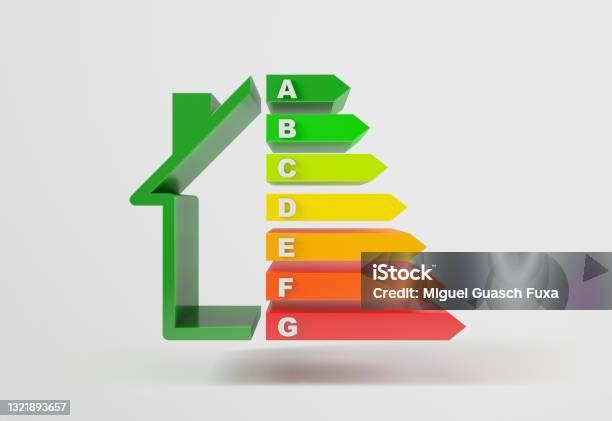
Energy-efficient AC systems provide multiple benefits beyond lower utility bills:
- Reduced environmental impact: Efficient systems consume less electricity, decreasing carbon footprint by up to 30%
- Extended equipment lifespan: Systems operating efficiently experience less strain, potentially lasting 5-7 years longer
- Improved indoor air quality: Well-maintained systems filter air more effectively, removing humidity and pollutants
- Enhanced comfort consistency: Efficient systems maintain steady temperatures with fewer hot and cold spots
- Higher property value: Energy-efficient HVAC systems increase home resale value by an average of 6-8%
Essential Energy-Efficient AC Maintenance Tips
Proper maintenance forms the foundation of energy-efficient AC operation. Houston’s dusty environment and high humidity create conditions that rapidly diminish system performance without regular attention. Professional HVAC technicians recommend specific maintenance practices tailored to local climate conditions.
Filter Replacement and Cleaning Strategy
Air filters play a critical role in system efficiency, yet they’re often overlooked by homeowners. In Houston’s dusty environment, filters accumulate debris faster than in other climates, requiring more frequent attention than manufacturer recommendations suggest.
Standard fiberglass filters should be replaced every 30-45 days during peak cooling season, while high-efficiency pleated filters may last 60-90 days. However, homes with pets, smokers, or family members with allergies require more frequent changes. A dirty filter restricts airflow, forcing your system to work harder and consume up to 15% more energy.
Professional tip: Check filters monthly by holding them up to light. If you cannot see light passing through clearly, replacement is necessary. Consider upgrading to MERV 8-11 rated filters for optimal balance between efficiency and airflow.
Coil Cleaning and Maintenance
Both evaporator and condenser coils accumulate dirt and debris that significantly impact efficiency. The evaporator coil, located inside your home, collects dust and particles from indoor air. When dirty, it cannot absorb heat effectively, reducing cooling capacity and increasing energy consumption.
Condenser coils face even greater challenges in Houston’s environment. Located outside, they’re exposed to pollen, leaves, grass clippings, and pollution that coat the fins and restrict heat dissipation. A dirty condenser coil can reduce system efficiency by 30% or more.
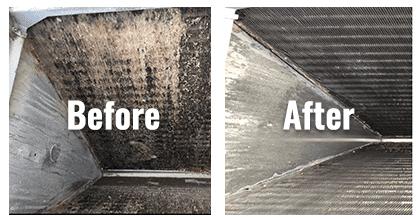
Annual professional coil cleaning is essential, but homeowners can perform basic maintenance:
- Clear vegetation and debris from around outdoor units, maintaining 2-3 feet clearance
- Gently rinse condenser coils with garden hose (never use pressure washer)
- Remove leaves and debris from coil fins using soft brush
- Schedule professional deep cleaning annually or bi-annually for optimal performance
Thermostat Optimization Techniques
Smart thermostat programming can reduce cooling costs by 10-20% without sacrificing comfort. Houston’s climate allows for strategic temperature adjustments that maximize efficiency while maintaining comfortable indoor conditions.
The Department of Energy recommends setting thermostats to 78°F when home and 85°F when away during summer months. However, Houston’s humidity requires careful consideration—setting temperatures too high can create uncomfortable moisture levels that make homes feel warmer than actual temperature readings suggest.
Optimal Houston thermostat strategies include:
- Gradual temperature adjustments of 1-2 degrees rather than dramatic changes
- Using programmable schedules that account for Houston’s extended cooling season
- Installing humidity controls to maintain 40-50% relative humidity indoors
- Utilizing ceiling fans to create air circulation, allowing comfortable temperatures 3-4 degrees higher
Ductwork Inspection and Sealing
Leaky ductwork represents one of the largest sources of energy waste in Houston homes. The typical residential duct system loses 20-30% of conditioned air through leaks, gaps, and poor connections. In Houston’s hot climate, this translates to hundreds of dollars in wasted energy annually.
Common ductwork problems include:
- Disconnected duct joints at registers and main trunk lines
- Deteriorated duct sealing tape and mastic
- Inadequate insulation in unconditioned spaces like attics
- Crushed or kinked flexible ducts reducing airflow
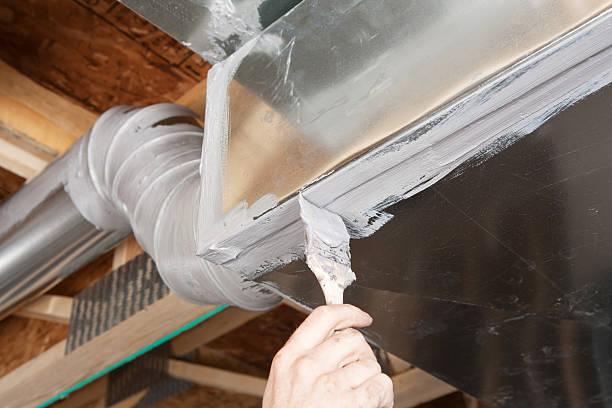
Professional duct sealing using aeroseal technology can improve system efficiency by 15-25%. This advanced process seals leaks from the inside using specialized equipment that identifies and closes gaps throughout the entire duct system.
Professional AC Repair Solutions for Maximum Efficiency
While homeowners can perform basic maintenance, achieving optimal energy efficiency requires professional expertise. Licensed HVAC technicians possess specialized tools and knowledge necessary to diagnose and repair issues that significantly impact system performance.
Refrigerant Level Optimization
Proper refrigerant levels are crucial for efficient AC operation. Too little refrigerant reduces cooling capacity and forces the system to run longer cycles, while too much refrigerant can damage compressor components and reduce efficiency.
Houston’s extreme temperatures make refrigerant issues more pronounced. Systems low on refrigerant struggle to remove heat effectively, often running continuously without achieving desired temperatures. This not only wastes energy but can lead to compressor failure—a repair costing $2,000-4,000.
Professional refrigerant service includes:
- Leak detection using electronic sensors and UV dyes
- Pressure testing to ensure system integrity
- Proper refrigerant recovery and charging according to manufacturer specifications
- Performance testing to verify optimal operation
Electrical Component Inspection
AC systems contain numerous electrical components that directly affect efficiency and reliability. Worn contactors, capacitors, and wiring connections create resistance that forces motors to work harder and consume more energy.
Houston’s high humidity accelerates electrical component deterioration. Moisture infiltration causes corrosion and connection problems that reduce system efficiency and reliability. Professional electrical inspections identify these issues before they cause system failures or safety hazards.
Critical electrical components requiring professional attention include:
- Capacitors: Store electrical energy for motor startup; failure causes hard starting and increased energy consumption
- Contactors: Control electrical connections to major components; worn contacts create resistance and heat
- Wiring connections: Loose or corroded connections reduce efficiency and create fire hazards
- Control boards: Electronic controls that optimize system operation and energy usage
Compressor Maintenance and Optimization
The compressor represents the heart of your AC system and consumes the most energy during operation. Maintaining optimal compressor performance is essential for energy efficiency and system longevity.
Houston’s extended cooling seasons place tremendous stress on compressors. Systems running 8-10 hours daily from March through November require specialized maintenance to prevent premature failure and maintain efficiency.
Professional compressor service includes lubrication system checks, vibration analysis, and performance testing to ensure optimal operation. Properly maintained compressors operate 15-20% more efficiently than neglected units.
Seasonal Maintenance Schedule for Houston Climate
Houston’s unique climate requires a customized maintenance approach that accounts for extended cooling seasons and specific environmental challenges. Professional HVAC contractors recommend a comprehensive maintenance schedule aligned with local weather patterns.
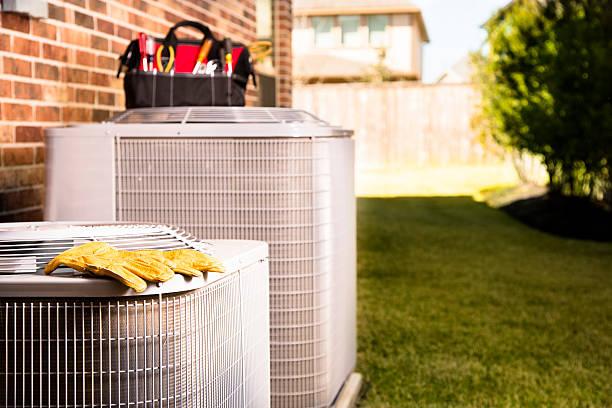
| Season | Maintenance Tasks | Professional Services |
|---|---|---|
| Spring (March-May) | Filter replacement, outdoor unit cleaning, thermostat programming | Comprehensive tune-up, refrigerant check, electrical inspection |
| Summer (June-August) | Monthly filter checks, drain line maintenance, temperature monitoring | Mid-season performance check, emergency repairs as needed |
| Fall (September-November) | Continued filter maintenance, outdoor unit protection prep | Post-season inspection, component replacement planning |
| Winter (December-February) | System rest period, heating system maintenance if applicable | Off-season repairs, equipment upgrades, efficiency improvements |
Cost Comparison: DIY vs Professional Service
Understanding the true costs of DIY maintenance versus professional service helps homeowners make informed decisions about AC care. While basic maintenance tasks offer opportunities for savings, complex repairs require professional expertise to avoid costly mistakes.
DIY maintenance tasks appropriate for homeowners include:
- Filter replacement ($15-30 monthly vs $50-75 professional service)
- Basic outdoor unit cleaning ($0 vs $75-125 professional cleaning)
- Thermostat programming ($0 vs $50-100 professional programming)
- Register cleaning and airflow checks ($0 vs $75-150 professional inspection)
Professional services that require expert knowledge:
- Refrigerant service and leak detection ($150-400 vs potential $2,000+ compressor replacement if DIY fails)
- Electrical component replacement ($100-300 vs fire hazards and system damage from improper installation)
- Ductwork sealing and insulation ($300-800 vs 20-30% ongoing energy waste)
- Compressor maintenance ($200-400 vs $2,000-4,000 replacement costs)
The optimal approach combines regular DIY maintenance with annual professional service. This strategy typically costs $300-500 annually but can save $500-1,200 in energy costs and prevent major repair expenses.
Signs Your AC Needs Professional Attention
Recognizing early warning signs of AC problems helps prevent energy waste and costly repairs. Houston homeowners should watch for specific symptoms that indicate professional service is necessary.
Immediate professional attention is required for:
- Reduced cooling capacity: System runs continuously but fails to reach set temperatures
- Unusual noises: Grinding, squealing, or clicking sounds during operation
- Increased energy bills: 20%+ increases without usage pattern changes
- Frequent cycling: System turns on and off repeatedly without reaching temperature
- Poor airflow: Weak air movement from registers throughout home
- High humidity: Indoor humidity levels consistently above 50-55%
- Ice formation: Visible ice on indoor or outdoor coils during operation
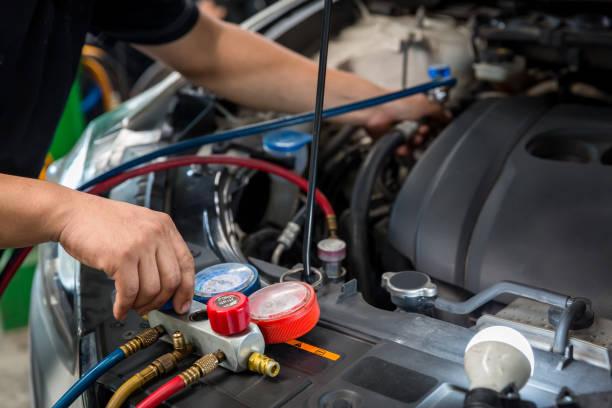
According to HVAC industry data, addressing problems early reduces repair costs by an average of 60% compared to waiting for complete system failure. Houston’s demanding climate makes early intervention particularly important for maintaining efficiency and preventing extensive damage.
Energy-Saving Technologies and Upgrades
Modern HVAC technology offers numerous opportunities to improve energy efficiency beyond basic maintenance. Houston homeowners can benefit from strategic upgrades that provide long-term savings and improved comfort.
High-impact efficiency upgrades include:
- Variable-speed air handlers: Adjust fan speeds to match cooling demands, reducing energy consumption by 20-30%
- Smart thermostats with humidity control: Optimize temperature and moisture levels for maximum comfort and efficiency
- Zoned HVAC systems: Cool only occupied areas, potentially reducing energy usage by 25-40%
- High-efficiency air conditioning units: SEER ratings of 16+ provide significant energy savings over older systems
- Advanced ductwork insulation: Reduces heat gain in attics and unconditioned spaces
The average Houston home can save $300-800 annually through strategic efficiency upgrades. Federal and state rebate programs often offset 20-30% of upgrade costs, making improvements more affordable for homeowners.
For comprehensive AC installation of energy-efficient systems or professional AC repair services that maximize efficiency, working with licensed contractors ensures optimal results and warranty protection.
Conclusion: Maximizing Your AC Investment
Energy-efficient AC repair and maintenance represents one of the most effective ways Houston homeowners can reduce energy costs while improving indoor comfort. The combination of regular DIY maintenance and professional service creates a comprehensive approach that addresses the unique challenges of Houston’s climate.
Key takeaways for Houston homeowners:
- Regular filter replacement and coil cleaning can improve efficiency by 15-25%
- Professional maintenance prevents 80% of common AC problems and extends system lifespan
- Proper refrigerant levels and electrical components are crucial for optimal performance
- Strategic upgrades and technology improvements provide long-term energy savings
- Early problem detection reduces repair costs and prevents energy waste
The investment in energy-efficient AC maintenance typically pays for itself within one cooling season through reduced energy bills and prevented repairs. In Houston’s demanding climate, this approach is not just cost-effective—it’s essential for maintaining comfortable, affordable indoor environments year-round.
Ready to optimize your AC system’s efficiency and reduce energy costs? Contact our certified HVAC professionals today for a comprehensive efficiency assessment and personalized maintenance plan designed specifically for Houston’s climate challenges.
Frequently Asked Questions
How often should I change my AC filter in Houston’s climate?
Due to Houston’s high pollen, dust, and humidity levels, standard filters should be changed every 30-45 days during peak cooling season (March-November). High-efficiency pleated filters may last 60-90 days, but monthly inspections are recommended. Homes with pets, smokers, or family members with allergies require more frequent changes.
What’s the optimal thermostat setting for energy efficiency in Houston?
The Department of Energy recommends 78°F when home and 85°F when away. However, Houston’s humidity requires careful balance—setting temperatures too high can create uncomfortable moisture levels. Use ceiling fans to allow comfortable temperatures 3-4 degrees higher, and maintain indoor humidity between 40-50%.
How much can professional AC maintenance save on energy bills?
Professional maintenance typically improves system efficiency by 15-25%, translating to annual savings of $300-600 for average Houston homes. The investment in annual maintenance ($150-300) usually pays for itself within one cooling season through reduced energy consumption and prevented repairs.
When should I consider replacing versus repairing my AC system?
Consider replacement if your system is over 10 years old, requires frequent repairs costing more than 50% of replacement value, or has a SEER rating below 13. In Houston’s demanding climate, older systems often struggle to maintain efficiency and may cost more to operate than newer, high-efficiency units.
What are the signs that my ductwork needs professional sealing?
Common signs include uneven cooling throughout your home, higher-than-normal energy bills, dusty indoor air, and rooms that never reach desired temperatures. Professional duct testing can identify leaks responsible for 20-30% energy waste. Aeroseal duct sealing typically improves efficiency by 15-25%.
How does Houston’s humidity affect AC efficiency?
High humidity makes your AC work harder to achieve comfortable conditions. Systems must remove moisture from air in addition to cooling it, increasing energy consumption. Proper dehumidification is crucial—indoor humidity above 50-55% not only feels uncomfortable but can lead to mold growth and indoor air quality issues.
